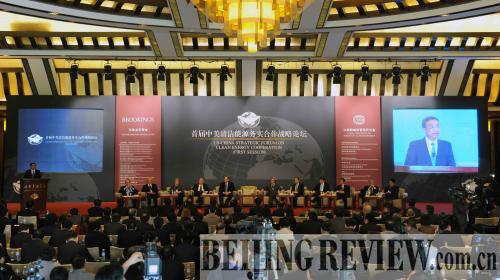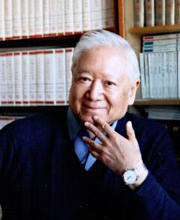|
 |
|
ENERGY FORUM: Former U.S. Vice President and environmental activist Al Gore and a group of American guests attend the China-U.S. Strategic Forum on Clean Energy Cooperation on October 22 (LI TAO) |
On October 22, the China Institute of Strategy and Management and the U.S. Brookings Institution jointly held the China-U.S. Strategic Forum on Clean Energy Cooperation. At the opening session of the forum, Zheng Bijian, Chairman of the China Institute of Strategy and Management, gave a keynote speech. Edited excerpts follow:
 |
|
Zheng Bijian, Chairman of the China Institute of Strategy and Management (XINHUA) |
The China-U.S. Strategic Forum on Clean Energy Cooperation took place at a good time—in the midst of the UN Summit on Climate Change, the forthcoming visit of U.S. President Barack Obama to China and the Copenhagen Summit on Climate Change. It showed the concern for the safety of the Earth of scholars and business people in our two countries.
Former U.S. Vice President Al Gore had accepted the invitation to address the forum. Chinese Premier Wen Jiabao met him and other distinguished American guests. They had a good discussion on the issue of environmental protection and China-U.S. cooperation in the area of clean energy. Vice Premier Li Keqiang also met Mr. Gore and the American participants. The vice premier delivered an important speech at the forum's opening ceremony. All this shows the importance the Chinese leadership attaches to clean energy development and China-U.S. cooperation in this area.
The forum had two features—studies of the energy strategies of our two countries and ways we can practically cooperate. The discussion focused on the clean energy strategies of our two countries, convergence of our strategies and cooperation between our two countries' enterprises, regions and research institutions. It was not just a "talk shop," but also, more importantly, a "do shop." The message is loud and clear: Let us work together in clean energy development and in addressing climate change.
International context of clean energy strategies in China and the United States
The hot topic in the world today is how to address the relationship between peaceful development and environmental protection. An eco-friendly environment holds the key to the success of peaceful development. Undoubtedly, to preserve the environment calls for the resolution of a lot of complicated problems. One of them is the building of a culture of conservation that needs to be launched in the first half of the 21st century and continued throughout it. Such a culture will ignite a revolution linking energy, environment and climate.
This is surely a great undertaking bearing on the future of mankind. It will bring about significant changes in the relationship between humanity, nature and the tremendous progress in human civilization. It will also put to a severe test different economic and social development models and strategies of countries with different political systems and economic levels. In this context, countries urgently need to ensure energy security and meet the challenges posed by global warming. The issue of clean energy, and the larger issues of energy resources, environment and climate change, have thus become the central element in the country's development strategy and external cooperation.
Since taking office, President Obama has made energy and climate change one of the three priorities of his administration. He has urged legislation in related areas and undertaken to observe a timetable that will see a reduction in greenhouse gas emissions. This is an adjustment of great significance that addresses humanity's concerns.
China, as a latecomer to modernization, has put energy and environment at the center of its development strategy. Our growing economy will cause us to face increasing pressure on our resources and environment in the 21st century. It is therefore essential, and even crucial, to quicken clean energy development for China's peaceful development. We have opted for a new type of industrialization. Our path of development aims at economic growth, improved livelihoods and a better environment. It is people-centered, comprehensive, balanced and sustainable development. To this end, a series of measures have been taken to optimize industrial structures and transform development modes and consumption habits. Not long ago, at the UN Summit on Climate Change, President Hu Jintao again explained to the international community China's strategy to promote a conservation culture and made serious commitments to reduce greenhouse gas emissions, raise the percentage of renewable energy in the Chinese energy portfolio, improve energy efficiency and increase forest coverage.
| 